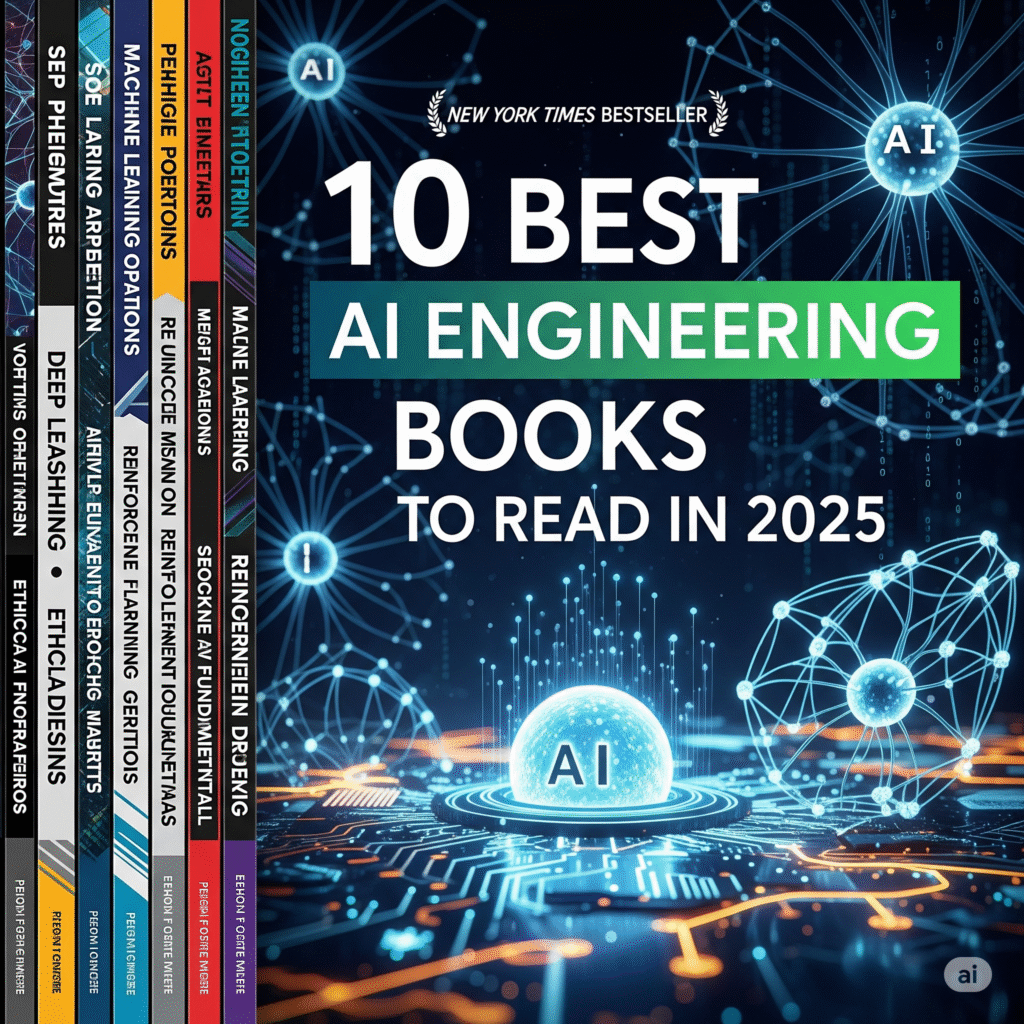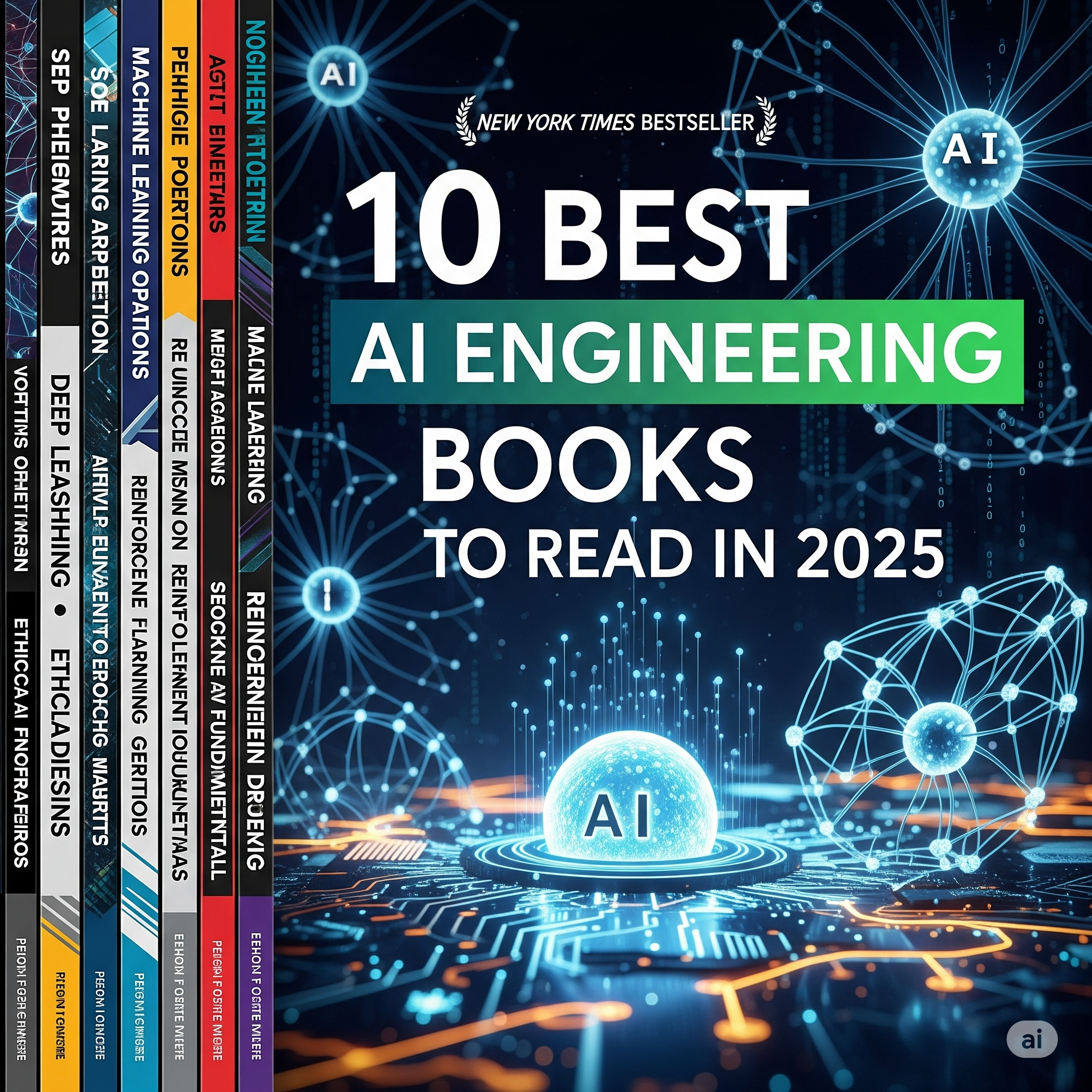Artificial Intelligence is transforming industries at an unprecedented pace, and AI engineering is at the heart of this revolution. Whether you’re building large language models, designing machine learning systems, or deploying AI at scale, having a strong foundation is essential.

One of the best ways to gain that foundation is by learning from the top AI engineering books carefully curated resources that blend theory with real-world application. In this guide, we’ve compiled a list of the most valuable books for AI engineers in 2025, covering everything from deep learning and MLOps to prompt engineering and generative AI.
1. Hands-On Large Language Models
A Practical Guide to Building and Fine-Tuning LLMs
If you want to go beyond using pre-built models and actually design, fine-tune, and deploy large language models, this book is your roadmap. It covers everything from transformer architecture basics to advanced topics like semantic search, retrieval-augmented generation (RAG), and deployment strategies. With step-by-step code examples and clear diagrams, it’s perfect for engineers aiming to create production-grade AI applications.
2. Designing Machine Learning Systems – Chip Huyen
This book is a blueprint for building real-world ML systems that are not just accurate but also scalable, maintainable, and resilient. It walks you through the full ML lifecycle—data pipelines, model selection, deployment, and monitoring—while highlighting trade-offs you’ll face in production. Chip Huyen’s industry experience shines through in practical tips and real-world case studies.
3. Practical MLOps: Operationalizing Machine Learning Models – Noah Gift & Alfredo Deza
Getting a model to work in Jupyter Notebook is one thing. Running it reliably in production is another. This book bridges that gap. It dives deep into CI/CD for ML, model monitoring, testing strategies, and tool selection for cloud-native workflows. Whether you’re deploying on AWS, GCP, or Azure, this guide ensures your models don’t just work—they stay working.
4. AI Engineering: Building Applications with Foundation Models – Chip Huyen
Foundation models like GPT-5, Claude, and LLaMA are changing AI development. This book teaches you how to build applications on top of these models, covering prompt engineering, fine-tuning, RAG pipelines, evaluation methods, and optimization techniques. It’s highly practical, making it perfect for AI engineers who want to move from experiments to real products.
5. Hands-On Machine Learning with Scikit-Learn, Keras, and TensorFlow – Aurélien Géron
A classic that remains one of the most approachable yet comprehensive ML guides available. You’ll learn the fundamentals—regression, classification, clustering—before progressing to deep learning, CNNs, RNNs, and deployment. With hands-on coding exercises, it’s an excellent resource for building a strong technical foundation.
6. Deep Learning – Ian Goodfellow, Yoshua Bengio, and Aaron Courville
Known as the “Bible of Deep Learning”, this book offers a theoretical deep dive into neural networks, optimization methods, and advanced architectures. It’s less about quick coding hacks and more about understanding why things work—making it invaluable for engineers who want to grasp the math and theory behind AI.
7. Machine Learning Design Patterns – Valliappa Lakshmanan, Sara Robinson, and Michael Munn
Think of this as a cookbook for solving common ML challenges. Each design pattern addresses a recurring problem in machine learning, such as handling imbalanced datasets, preventing data leakage, or managing concept drift. Every pattern includes context, solution, trade-offs, and real-world examples, making it a great reference for production ML work.
8. Building Machine Learning Powered Applications – Emmanuel Ameisen
Focused on shipping AI products, this book walks you through identifying the right problems to solve, designing ML pipelines, evaluating models, and collaborating effectively with product teams. It’s perfect for AI engineers working in startups or product-focused environments.
9. Natural Language Processing with Transformers – Lewis Tunstall, Leandro von Werra, and Thomas Wolf
Written by the team behind Hugging Face, this book is the go-to guide for modern NLP. You’ll learn to fine-tune transformer models for tasks like sentiment analysis, summarization, and question answering. It also covers optimization tricks to make your NLP applications faster and more efficient.
10. Generative Deep Learning – David Foster
If you’re excited about generative AI beyond just text—think image synthesis, music composition, and multi-modal models—this book is for you. It explains key architectures like GANs, VAEs, and diffusion models, with practical PyTorch and TensorFlow implementations.
Conclusion
Mastering AI engineering requires more than just coding skills — it demands a deep understanding of machine learning principles, system design, and the latest advancements in large language models. The AI engineering books in this list are more than reading material; they are roadmaps to becoming a better engineer, capable of building scalable, reliable, and innovative AI solutions.
Whether you’re just starting your journey or already working on production-grade AI systems, these books will help you bridge the gap between theory and practice. Start with the fundamentals, then dive into specialized topics like MLOps, NLP, and generative AI to stay ahead in this fast-moving field.
In 2025, the engineers who combine hands-on skills with continuous learning will lead the way. These books are your toolkit — make the most of them.
Related Reads
- Mastering GPT-5 Prompting: The Complete Guide to Smarter AI Outputs
- Mastering Context Engineering: 6 Proven Strategies to Make AI Agents Smarter and More Reliable
- LangChain vs LlamaIndex: Powerful Retrieval-Augmented Generation Tools Compared
- 20+ Mind-Blowing LLM Apps You Can Build Today – From AI Agents to RAG Pipeline
- Top10 Beginner-Friendly LLM Projects to Kickstart Your AI Journey


5 thoughts on “10 Best AI Engineering Books to Read in 2025”